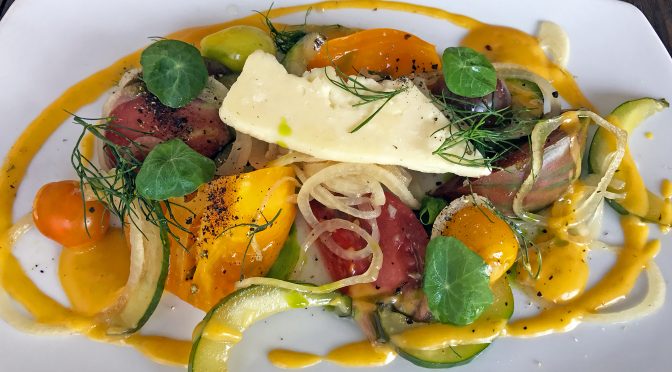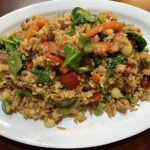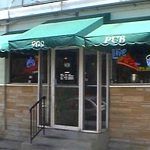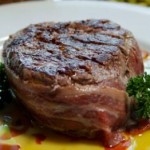By Robin Garr
LouisvilleHotBytes.com
Here comes another winter, the third since the global pandemic started early in 2020, and – talking mostly about the restaurant, food and drink scene here – where in the heck are we?
For a lot of us, things are feeling pretty good. Sure, quite a few of us have at least one Covid encounter for ourselves or a friend or loved one to spin tales about, But things are looking better now, right?
Better at least than at this point in 2020, when restaurants were figuring out how to make outdoor dining doable with torches and igloos; or even in 2021, when vaccines were available but the latest Covid variants were ramping up contagion.
This year? Jefferson County is in the green zone, a new, potent bivalent booster is available (even if relatively few people have had it yet), and there’s no sign of a seasonal spike on our charts. (England? Europe? Don’t be a buzzkill.)
Is the worst over?
Well, that sounds good. So does this mean that after two years of constant pain over the loss of beloved eateries and bars to Covid and Covid-related strain? Umm … not so fast.
The conventional wisdom during normal times is that 20% of restaurants fail in their first year. It’s a tough business. The pandemic made it worse, obviously, and shuttered a lot of established restaurants that otherwise might have made it. To be honest, a lot of the places that closed since March 2020 faced multiple strains, each one tearing things down in its own way.
Take the much-loved Decca, which closed last month after more than 10 years of service. Was it a victim of the pandemic? They didn’t say, but it’s hard to imagine that 2 1/2 years of soul-sucking contagion and its related stresses wasn’t a factor. But so, surely, was the departure of its founder and name chef, Annie Pettry, last March. What’s more, I’m told, landlord and lease issues came into play, as they so often do. Decca didn’t say, giving a month’s notice in an extended Facebook farewell “To our valued customers, employees, artists, musicians, vendors and friends,” with many thanks, “You will never know what it has meant to us and how you have impacted our lives. After 10+ years we will be packing up and moving on.”
So was it the pandemic? Not entirely, I’d say, but would things have looked different if Covid had never come calling? You tell me.
Looking back, another beloved NuLu eatery that didn’t make it through was an early victim, Harvest. Harvest’s backers were a bit more forthcoming, spilling a lot of detail in its September 2020 farewell. Kentucky restaurants and bars were then still operating at 50 percent capacity restrictions to allow social distancing, severely crunchig eateries that depend on dine-in traffic to make margins work. With the first Covid summer ending and cooler weather coming on, it was hard to imagine going through a winter with no vaccine then available.
“A brutal trade”
“The restaurant business is, in a word, a brutal trade,” the Harvest team wrote. “Funding is but one part of starting one, but the investment of time and emotion into such an enterprise is something few understand. Profits made in the restaurant business are modest, even under the best of circumstances. And when you commit, as we have, to buying the best ingredients possible, as locally as possible, costs rise even higher and margins narrow in step. A pandemic as we’re enduring now has made operating profitably largely impossible. Hardly an American anywhere needs any further explanation of how this has affected us and our employees. It has been an emotionally challenging year, and to have to write this letter announcing our closure only worsens it for us.”
It’s the same the whole world over, it seems, or across the U.S. anyway. As restaurant trade journal Plate magazine writer Lauren Mowery wrote in an October 11 report, “A global pandemic, labor shortages, supply-chain snags, and now inflation. Though different markets have micro-trends, every restaurant and wine bar operator in the United States has dealt with an endless barrage of calamities. How do businesses, many running on razor-thin margins, manage to stay afloat? Unfortunately, few great solutions exist beyond raising prices, shopping around, and accepting calculated losses – though some have turned to creative strategies with pricing and product selection.”
According to the restaurant industry app Seated, a sample of 50 small restaurants in major American cities revealed that two-thirds experienced decreased sales due to inflation. Just over three-quarters of restaurants in the survey increased menu prices. Others sought business or cut costs with discounts and promotions, reduced operating hours, reduced staff, or deleted lower-margin items from the menu.
The pressure continues
The pressure continues. As of August, the consumer price index was up 8.3 percent; the food index was even higher at 11.4 percent. And, reports the U.S. Bureau of Labor Statistics, consumer prices for beer, wine, and spirits at bars and restaurants were up 6.4 percent, 7.1 percent, and 4.2 percent, respectively, over the previous year.
With many of us facing similar increased prices on groceries and other necessary goods, it’s easy to understand the challenges that restaurants still face. Even if there’s not another Covid variant or surge.
As Yogi said, it ain’t over until it’s over. And at last glance, both Harvest’s and Decca’s former properties appear to remain vacant. In the meantime, perhaps the best thing we can do is keep on supporting local eateries with our dollars and our kind words. I’m up for that!




